Politics
/
October 23, 2024
A dispatch from the heart of the heart of a swing state.
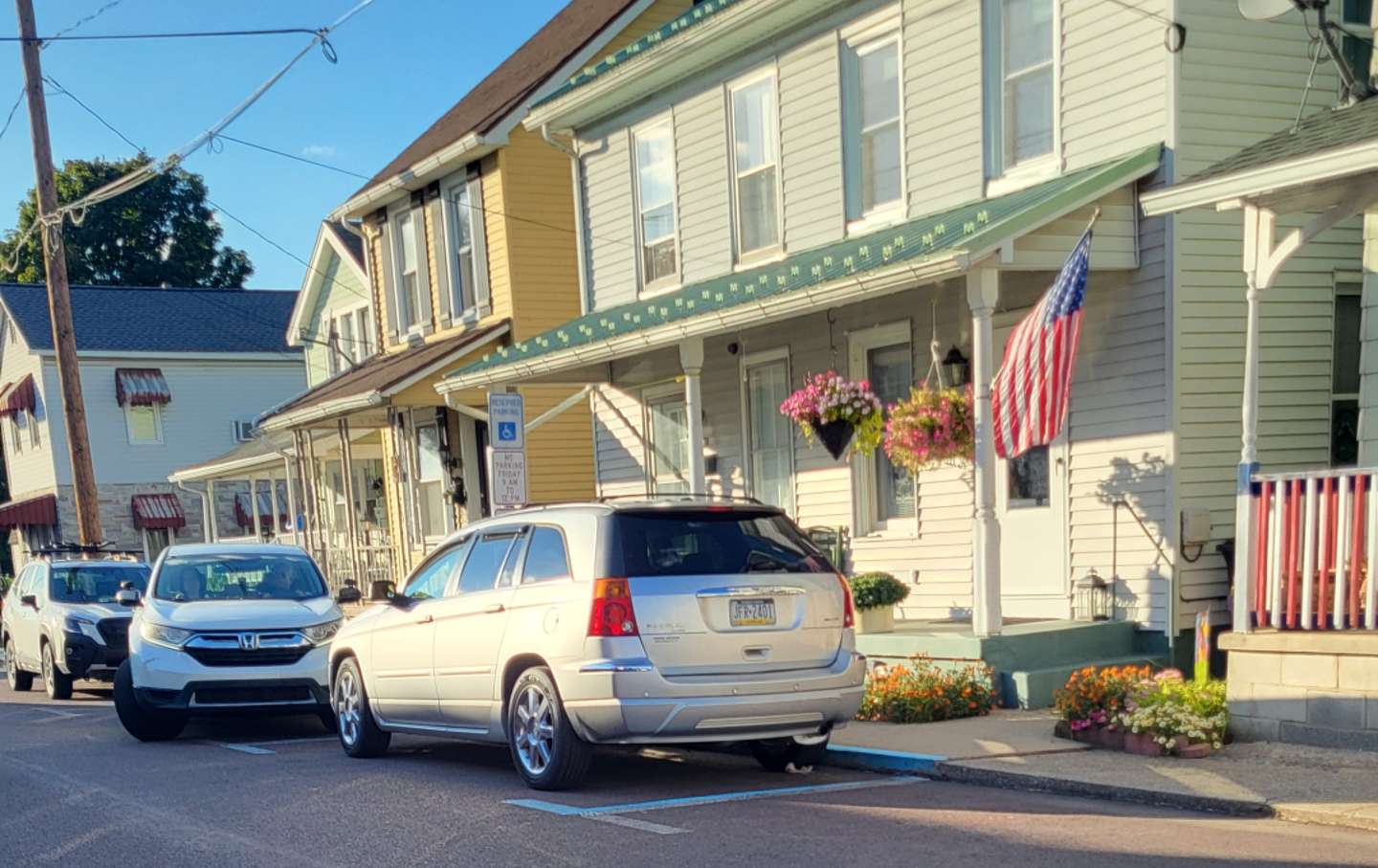
“I’m Voting for the Convicted Felon”
October can be a cruel month. Driving around my home county (Union) in central Pennsylvania, I saw a sign with the above message outside a house deep in the mountains. Its schadenfreude brought me back to Octobers past—2016 and 2020—waiting for the axe to fall. From a numb distance, I can still just about remember the last orderly time, in 2012. Mitt Romney would have done bad things, but hardly threatened the gimcrack, anti-majoritarian “democracy” we then all took for granted.
My home place is Lewisburg, site of Bucknell University (and a federal prison, but we don’t talk about that). It was always a lovely college town and is now gentrified and deep blue; Biden got 70 percent last time around. But the county is thoroughly red, with the town-versus-country divide plain in which signs dominate roadsides and front yards. The Dems got just 37 percent in Union County in 2020—slightly better than 35 percent four years before. As throughout rural PA, the Harris-Walz campaign’s goal in our 10-county North Central region is simply to cut into the Republicans’ margin. Running for governor against the January 6, 2021, participant Doug Mastriano in 2022, Josh Shapiro got almost 43 percent in Union, and anything like that across rural PA would doom Trump.
Coming home to Union County, to canvass and help put up big Harris signs on country roads, has brought a deep appreciation for the Democratic base, underneath the party’s layers of consultants, bureaucrats, fundraisers, pundits, and elected officials feeding at the trough of institutional power. City people, whether in Manhattan or Lewisburg, profile Trumpies as everyone not college-educated plus all the rural and small-town whites. These classist stereotypes are belied by the Harris voters you meet on the doorsteps here. ID’ing them for our final GOTV push, I’ve found several hundred working-class men and women joined by middle-class independents in the better-off suburbs. And this is not in fancy-pants Lewisburg—we canvass in rusty old towns across several counties, places like Sunbury, Selinsgrove, Danville, and Mifflinburg. In places like that, Harris-Walz signs are all mixed up with those for Trump-Vance, and our voters gesture ruefully at their neighbors.
Out here, Democrats are the people still committed to stand up for decency, if you’ll pardon that old genteel word. They are people who would never vote for a convicted felon, let alone boast about it. My impression is that the Trump years have toughened them in a quiet, Pennsylvania kind of way; they’ve gotten used to being hassled, yelled at. There is no longer any vagueness about where you stand, no mushy middle.
Certainly, there are plenty of surprises. Early on, I encountered a series of Democratic women backing Trump because they “don’t like the way the country is going” or “the border has been open for years,” and Harris didn’t do anything about it. Other than being white, they fit into no cohort—from a well-off woman in yoga pants to a bandanna’ed Harley rider.
But just as often, I’ve been happily surprised. Our “large sign” crew just put this up on a big road in farm country for Pam Weaver, a hardcore Dem living in her parents’ house, and there are plenty like her. She reminisced with satisfaction about all the crap she and her mom got in 2020 with their Biden sign and specified that we put the sign by her porch, so she could keep an eye on it.
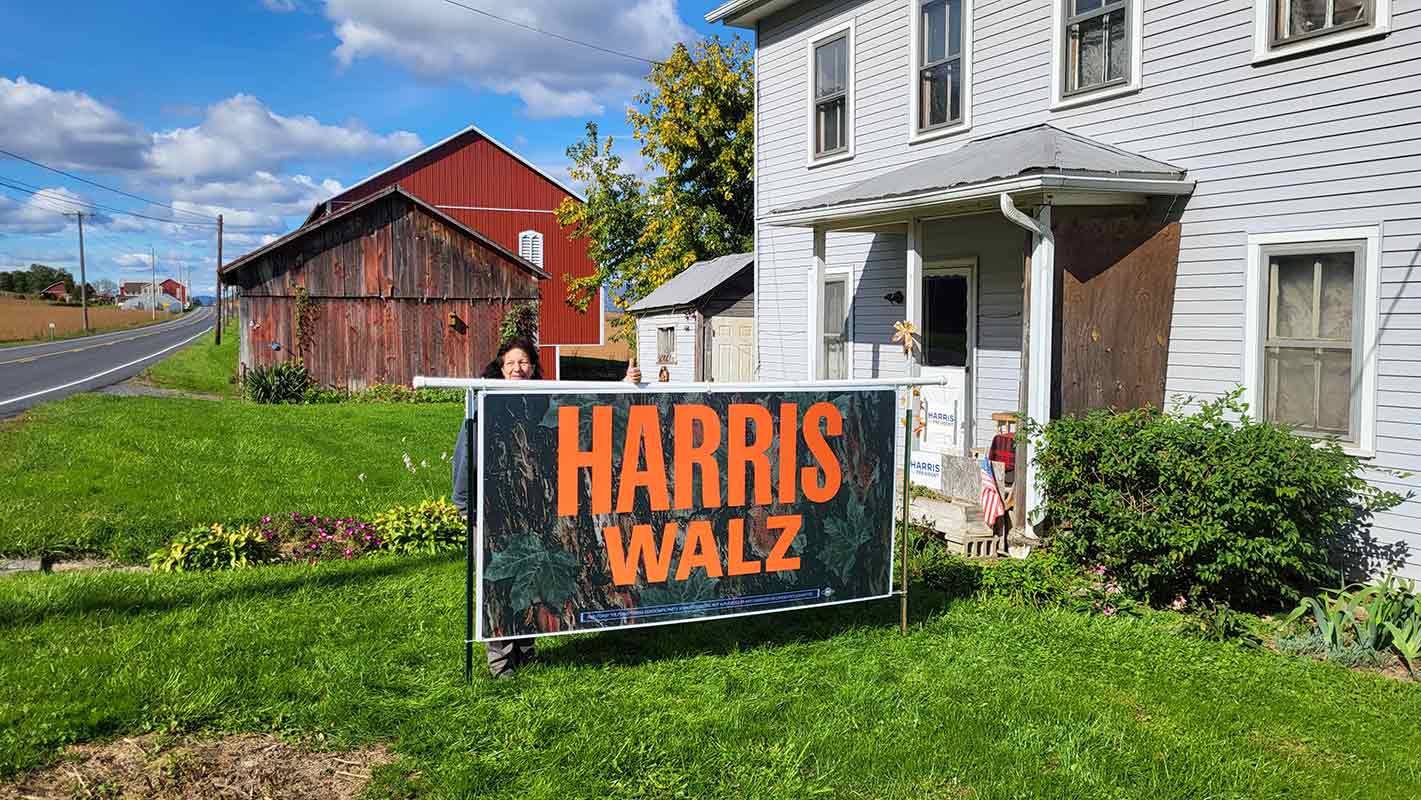
The second sign speaks to something else, something sadder. We had gone out to Juniata County, to fix a sabotaged sign. That Trump purveys the gutter pleasures of transgression is hardly news, but that what we used to call “toilet humor” is now so unremarkable in public, even triumphant, is just plain depressing. How do parents explain why that sign is “funny” to their children in this tiny community?
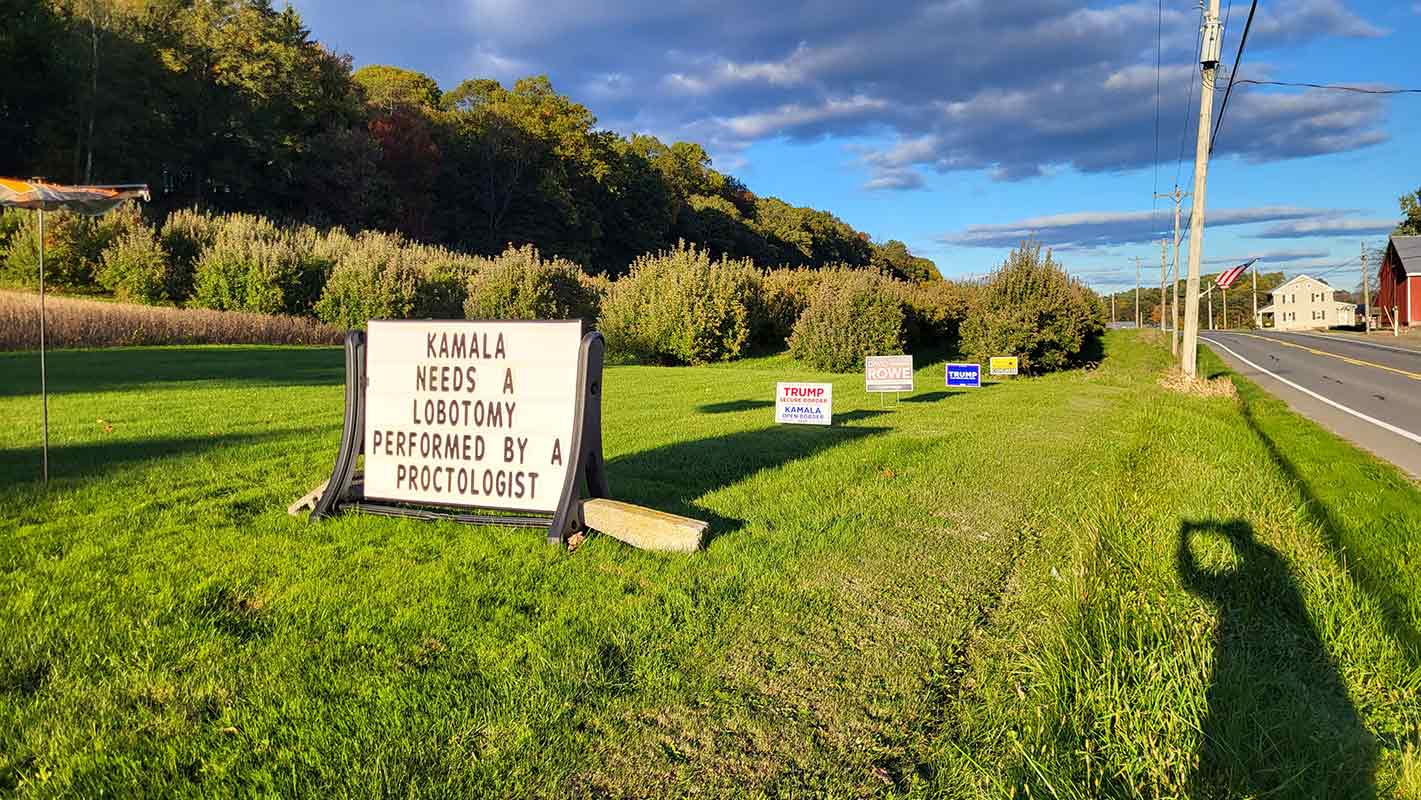
The most heartening things I’ve heard are that there are distinctly fewer Trump signs than last time, and that the widespread hostility to Democrats is abating amid semi-covert signs of encouragement. Last Wednesday, The New York Times reported that Lancaster County, where I used to teach, was turning purplish. It focused on how the Democrats’ float and booth got a better-than-usual response at Ephrata’s annual Fair Parade. That same day I was driving around with Gary Kendall, a retired engineer and expert sign-erector, and he casually mentioned noticing the same phenomenon while staffing the booth at Union County’s West End Fair a few weeks back, how some “older women were even giving us thumbs-up.”
Since we don’t canvass Republicans (unless they are living with Dems), I haven’t seen any overt hostility other than barely polite dismissals from independents for Trump. The closest call was when I and another volunteer were out in Snyder County’s seat, Middleburg, where Shapiro got under 32 percent and Biden less than 26 percent. At a house festooned with Trumpernalia, our app showed a non-gender-specific 21-year-old Democrat, so we went up on the porch and knocked. A middle-aged man came out and berated us (didn’t we see his “No Soliciting” sticker?) and as we quickly exited was heard to shout “the fucking Democratic Party!” either to himself or someone else. Still, not exactly a threat of mob violence
Friends reading my e-mail reports about this work ask me for a prediction about how Pennsylvania will go on November 5, to which I answer that I’m not that big a fool. The Republican base is very solid, almost monolithic, and all we can do is chip at its edges, while making sure everyone opposed to Trump gets to the polls. The mood on our side—and perhaps on theirs too—is resigned, stoic even. But if you have bought into the tropes about Democrats as “coastal elites” cut off from working people, think again. Out here in central PA, there are plenty of us, all kinds of folks—farmers and blue-collar workers, professors and techies, retirees and fired-up youth. And no one is backing down.
Can we count on you?
In the coming election, the fate of our democracy and fundamental civil rights are on the ballot. The conservative architects of Project 2025 are scheming to institutionalize Donald Trump’s authoritarian vision across all levels of government if he should win.
We’ve already seen events that fill us with both dread and cautious optimism—throughout it all, The Nation has been a bulwark against misinformation and an advocate for bold, principled perspectives. Our dedicated writers have sat down with Kamala Harris and Bernie Sanders for interviews, unpacked the shallow right-wing populist appeals of J.D. Vance, and debated the pathway for a Democratic victory in November.
Stories like these and the one you just read are vital at this critical juncture in our country’s history. Now more than ever, we need clear-eyed and deeply reported independent journalism to make sense of the headlines and sort fact from fiction. Donate today and join our 160-year legacy of speaking truth to power and uplifting the voices of grassroots advocates.
Throughout 2024 and what is likely the defining election of our lifetimes, we need your support to continue publishing the insightful journalism you rely on.
Thank you,
The Editors of The Nation
More from The Nation

For all the bogus furor MAGA world has raised over immigrant pet-eating, the real animal slayers are pursuing high office and making policy for the GOP.
Ben Schwartz
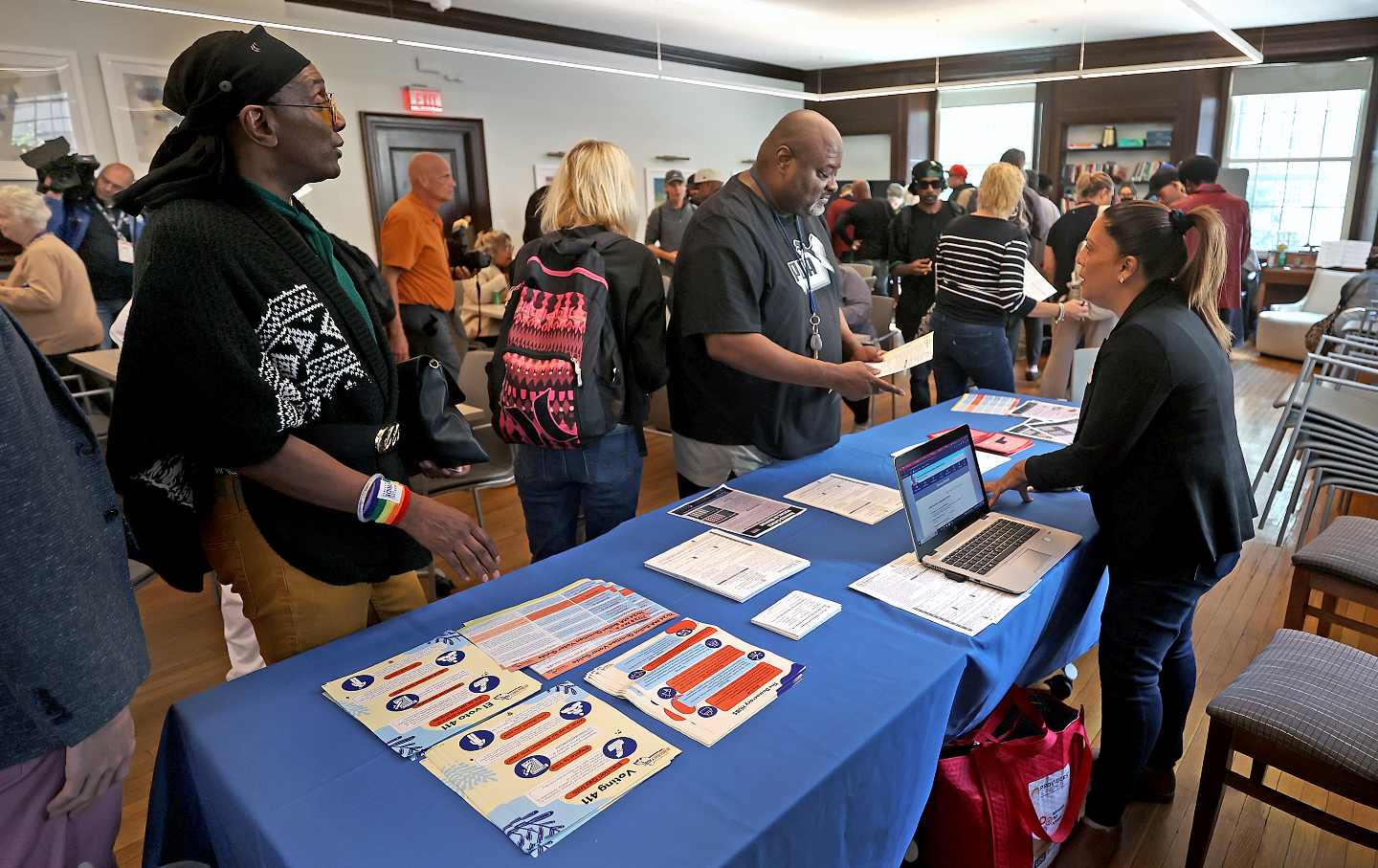
Turnout is low among people experiencing homelessness–a result of restrictive registration laws, political disaffection, and the misconception that they’re not allowed to vote.
StudentNation
/
Maggie Grether

Tammy Baldwin’s rival stumbled on an issue that matters—a lot—to the state’s large base of rural voters. That could tip a key race.
John Nichols
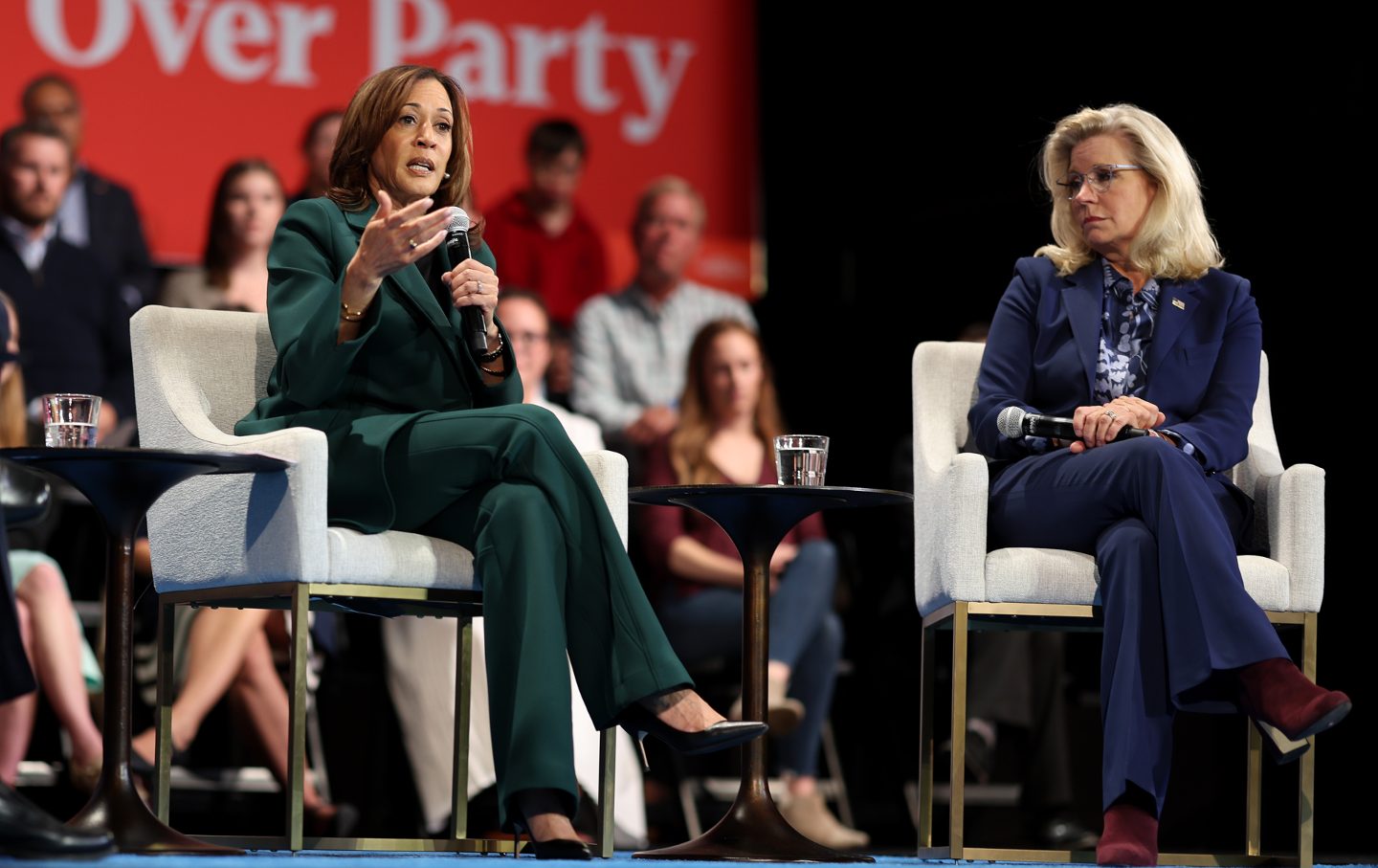
In town halls with Liz Cheney, Kamala Harris has made no known concessions to win Cheney’s support, while Cheney has come out in opposition to the Dobbs decision. What’s not to li…
Joan Walsh

Felecia Phillips Ollie DD (h.c.) is the inspiring leader and founder of The Equality Network LLC (TEN). With a background in coaching, travel, and a career in news, Felecia brings a unique perspective to promoting diversity and inclusion. Holding a Bachelor’s Degree in English/Communications, she is passionate about creating a more inclusive future. From graduating from Mississippi Valley State University to leading initiatives like the Washington State Department of Ecology’s Equal Employment Opportunity Program, Felecia is dedicated to making a positive impact. Join her journey on our blog as she shares insights and leads the charge for equity through The Equality Network.





